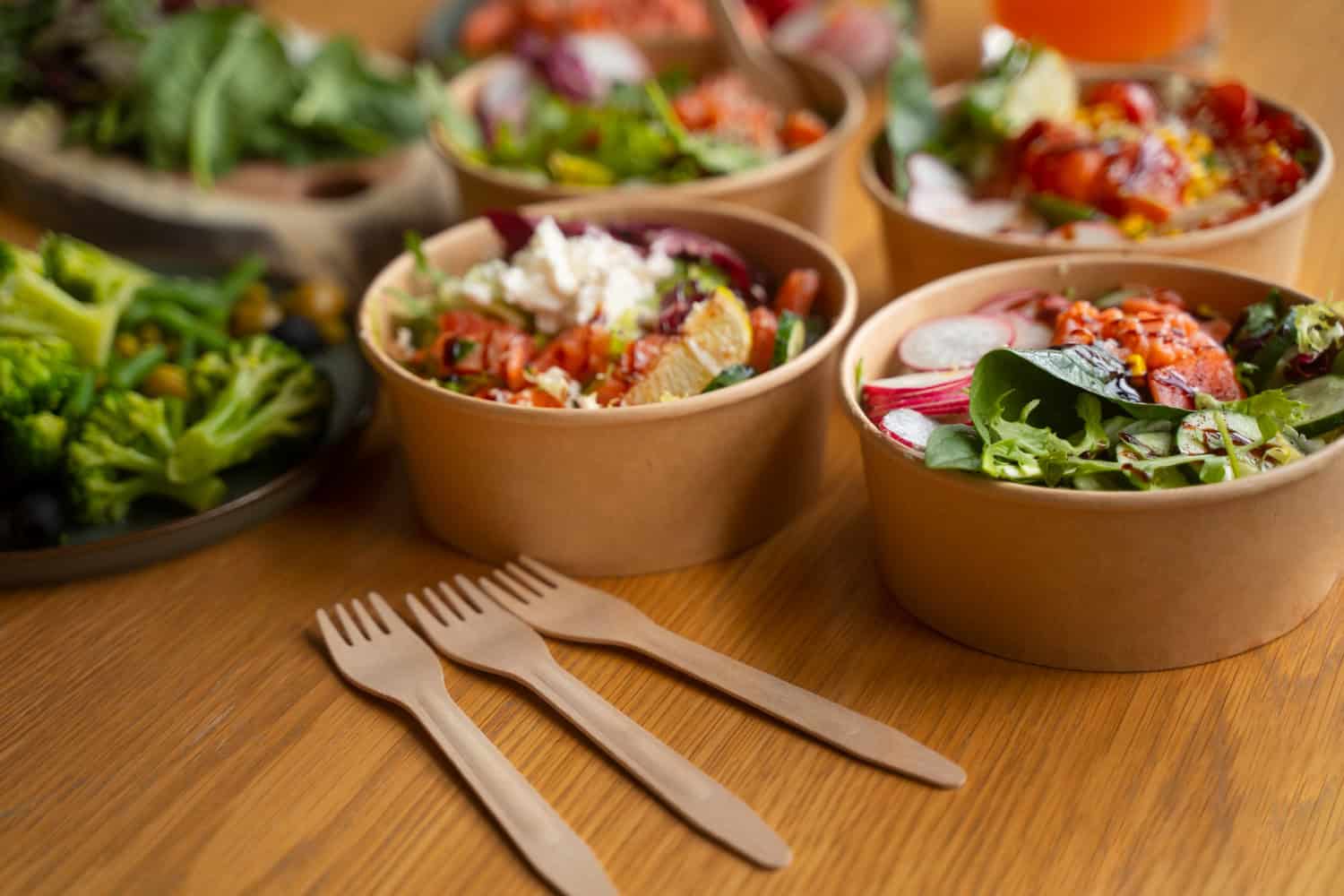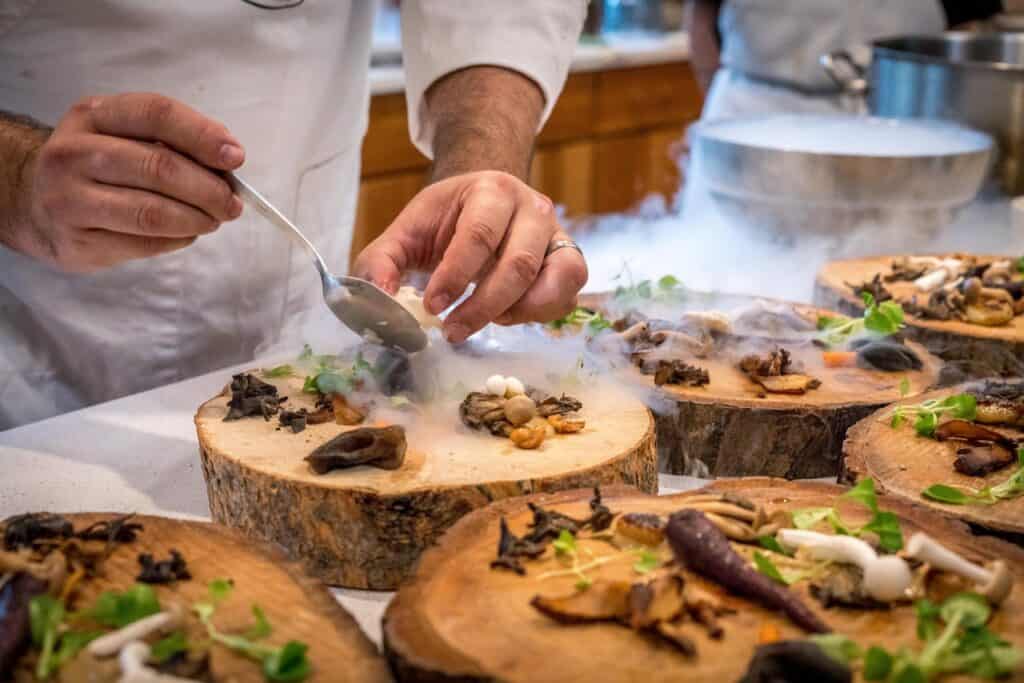
By Jermaine Thomas April 1, 2025
The catering sector is taking the lead as the discussion about waste reduction, climate change, and ethical living picks up steam. A new generation of environmentally conscious food service providers is revolutionizing the traditional catering model for events ranging from corporate luncheons to weddings. These businesses consider ecological concerns in addition to providing mouthwatering food. Welcome to the era of sustainable catering, where responsibility and food coexist.
Whether you’re an event planner, business owner, or someone hosting a private gathering, understanding the value of green catering practices is essential.
What Is Sustainable Catering?
Sustainable catering is about more than just offering healthy or organic meals. It’s a complete reimagining of how catering functions, from sourcing ingredients to serving guests. By adopting environmentally conscious strategies, caterers reduce their carbon footprint and contribute to a healthier planet.
A thoughtful choice of ingredients is one of the most crucial elements of sustainable catering. Eco-friendly caterers frequently collaborate with regional farmers and suppliers. This promotes regional agriculture and lowers emissions from transportation. Freshness and sustainability are also promoted by seasonal menus that are based on what is currently available.
Another key feature is minimizing waste. This includes everything from how much food is prepared to how leftovers are managed. Zero-waste events aim to leave no trace behind, no piles of plastic, no untouched trays of food, and no waste sent to landfills unnecessarily.
Why Eco-Friendly Food Service Matters
The environmental impact of catering is significant. Single-use plastics, non-recyclable packaging, and long-distance ingredient sourcing contribute to pollution and greenhouse gas emissions. With so many events happening every day, even small changes in catering practices can lead to substantial benefits for the planet.
Eco-friendly food service is important because it provides a practical means of minimizing environmental damage while still satisfying customer needs. Convenience and sustainability are bridged by it. By using eco-friendly practices, caterers lead by example and contribute to the public’s education about responsible consumption.
Choosing sustainable catering doesn’t mean sacrificing quality. On the contrary, many eco-conscious caterers find that these practices lead to more innovative, flavorful, and meaningful menus. Plus, there’s growing demand from customers who want their events to reflect their values.

The Core Principles of Green Catering Practices
Every catering company has its own approach to sustainability, but several core principles form the foundation of green catering practices. These principles guide everything from ingredient selection to service style, helping businesses reduce their environmental impact without compromising quality or guest experience.
Seasonal and local ingredients are important. Purchasing produce from nearby farms helps the local economy and lowers transportation-related emissions. In addition to being fresher, seasonal foods grow with fewer artificial inputs.
Organic and ethically sourced ingredients are another must. These items are grown without harmful chemicals and often come from farms that prioritize worker welfare. Ethically raised meat, for example, means animals are treated humanely and farming practices are more sustainable.
Minimal packaging is also essential. Green catering practices often involve reusable trays, glassware, and linens. If disposables are needed, eco-friendly options like compostable or recyclable materials are used instead. In short, every aspect of the event is designed with the environment in mind.
Zero-Waste Events: Turning Vision into Reality
One of the most exciting developments in the world of eco-conscious food service is the rise of zero-waste events. These events aim to create no trash that ends up in a landfill. It’s an ambitious goal, but with careful planning, it’s completely achievable, even for large gatherings.
One excellent place to start is by reducing food waste. Nowadays, a lot of caterers collaborate with hosts to precisely estimate the number of guests and serving sizes. The chance of food going uneaten is decreased by using smaller plates or tasting portions. Instead of being thrown away, leftovers are composted or given to nearby shelters.
Beyond food, packaging and serving items are reconsidered. Gone are the days of plastic cutlery and Styrofoam plates. Instead, caterers use bamboo utensils, recycled paper napkins, and edible cups and spoons. Water and drinks are served in refillable glass containers, reducing the need for single-use bottles.
Zero-waste events are not only better for the planet, they also make a powerful statement. Guests notice the effort and often leave inspired to make changes in their own lives.
The Rise of Plant-Based Menus
Plant-based catering is another powerful way to embrace sustainability. As more people become aware of the environmental toll of animal agriculture, the demand for plant-forward menus is skyrocketing. This trend fits perfectly within the framework of eco-friendly food service.
Producing meals that are plant-based uses a lot less resources. They produce fewer greenhouse gases, use less water, and require less land than dairy and meat. One of the easiest ways to go green with catering is to include more grains, legumes, and vegetables.
Caterers don’t need to go fully vegan to make a difference. Even offering a few plant-based options can reduce environmental impact. Plus, these dishes tend to be inclusive, catering to vegetarians, vegans, and those with dietary restrictions.
And let’s not forget the creativity involved. From jackfruit tacos to mushroom “meatballs,” plant-based dishes are bold, flavorful, and memorable. It’s a smart way for sustainable catering businesses to stand out.
Eco-Friendly Event Logistics
Sustainability isn’t just about what’s on the plate. Behind the scenes, logistics play a huge role in how green an event really is. Eco-conscious caterers are rethinking transportation, kitchen operations, and delivery methods to reduce their overall footprint.
Emissions from transportation can be significant, particularly when food is being delivered over long distances. Because of this, a lot of eco-friendly catering companies concentrate on serving their local communities, occasionally utilizing electric cars or bicycle deliveries when practical.
In the kitchen, energy-efficient appliances and mindful practices help reduce electricity and water use. For example, high-efficiency dishwashers use less water, and induction cooktops are more energy-efficient than gas stoves.
Even small logistical tweaks, like organizing fewer delivery runs or preparing everything in a single kitchen location, can make a significant impact. These behind-the-scenes adjustments are essential parts of true green catering practices.
Educating Clients on Sustainable Event Planning
For eco-friendly catering to truly flourish, education is key. Many clients are willing to go green, they just don’t know where to start. Caterers who take the time to explain sustainable options often find that their clients are eager to learn and participate.
Offering consultations is crucial for this reason. Caterers can help customers make decisions about zero-waste event planning, locally sourced ingredients, and compostable packaging. Client support and investment in these decisions are positively correlated with their level of understanding.
Some companies now offer full-service sustainable event planning. This means they not only cater the food but also guide the entire event through a green lens, from decorations to guest favors. These all-in-one solutions are becoming more popular among eco-conscious hosts.
Ultimately, transparency builds trust. By showing what steps are being taken to be eco-friendly, caterers strengthen their brand and deepen their relationship with customers.
Technology’s Role in Sustainable Catering
Technology is proving to be an unexpected but powerful ally in the shift toward sustainable catering. From digital event management tools to inventory tracking systems, tech makes it easier to reduce waste and improve efficiency.
As example, consider clever menu planning. In order to avoid overproduction, caterers can use online tools to estimate how much food to prepare based on guest numbers and preferences. Additionally, by eliminating the need for printed invitations, digital RSVPs help keep events paper-free.
Another major benefit is inventory tracking. Caterers can monitor food supplies, expiration dates, and waste levels in real time. This allows for smarter purchasing and better planning for future events.
Technology supports eco-friendly food service by streamlining operations and reducing the chance of human error. When combined with green practices, it forms a powerful formula for sustainable success.
Challenges in Implementing Green Catering Practices
Of course, transitioning to sustainable catering isn’t without challenges. Like any major shift, it requires time, investment, and commitment. The most common obstacles are cost and accessibility, but they’re not insurmountable.
Eco-friendly packaging, organic ingredients, and energy-efficient equipment can be more expensive upfront. Smaller catering companies may find these costs difficult to absorb. However, many report that long-term savings and customer loyalty offset the initial investment.
Sourcing is another obstacle. Local, seasonal, or organic produce is not always readily available in every area. When the perfect ingredients aren’t available, caterers may need to modify their menus or come up with creative alternatives.
Despite these challenges, the benefits far outweigh the difficulties. With innovation and collaboration, sustainable practices can become the new standard in catering.

The Business Case for Sustainable Catering
Going green isn’t just good for the environment, it’s good for business. More clients are looking for eco-conscious options, and caterers that meet that demand stand out in a competitive market.
The trend is being driven by Gen Z and Millennials in particular. When selecting service providers, they give consideration to environmental impact, social responsibility, and transparency. Caterers who maintain these principles draw in a loyal, mission-driven clientele.
Sustainable catering also offers a compelling marketing story. Sharing your journey toward eco-friendly food service, whether it’s reducing waste or switching to electric delivery vehicles, shows authenticity and commitment.
In the long run, green catering practices strengthen your brand, build trust, and open doors to new opportunities.
The Role of Certifications and Partnerships
For catering companies looking to formalize their efforts, certifications can add credibility. Programs like the Green Restaurant Association or regional sustainability networks help caterers stay accountable and visible in the eco-conscious space.
In addition to offering a framework for best practices, certifications reassure customers that a company is sincere about sustainability. Particularly for government or corporate events, some clients even demand that vendors possess green credentials.
Partnerships are also key. Working with local farms, composting facilities, and other eco-friendly food service providers creates a network of like-minded collaborators. These partnerships make it easier to deliver on sustainability promises and share resources.
Looking Ahead: The Future of Eco-Friendly Catering
The catering business is changing quickly. Eco-friendly catering is evolving into more than a trend due to growing climate concerns and changing consumer expectations. It is the food service industry’s future.
More innovation is probably in store for us in the years to come. Consider carbon-neutral kitchen operations, entirely plant-based events, and edible packaging. The potential for sustainable catering will only increase as new tools and ideas are developed.
What’s clear is this: clients, caterers, and communities all benefit from greener practices. The events of tomorrow will not only feed our appetites, they’ll reflect our values, too.